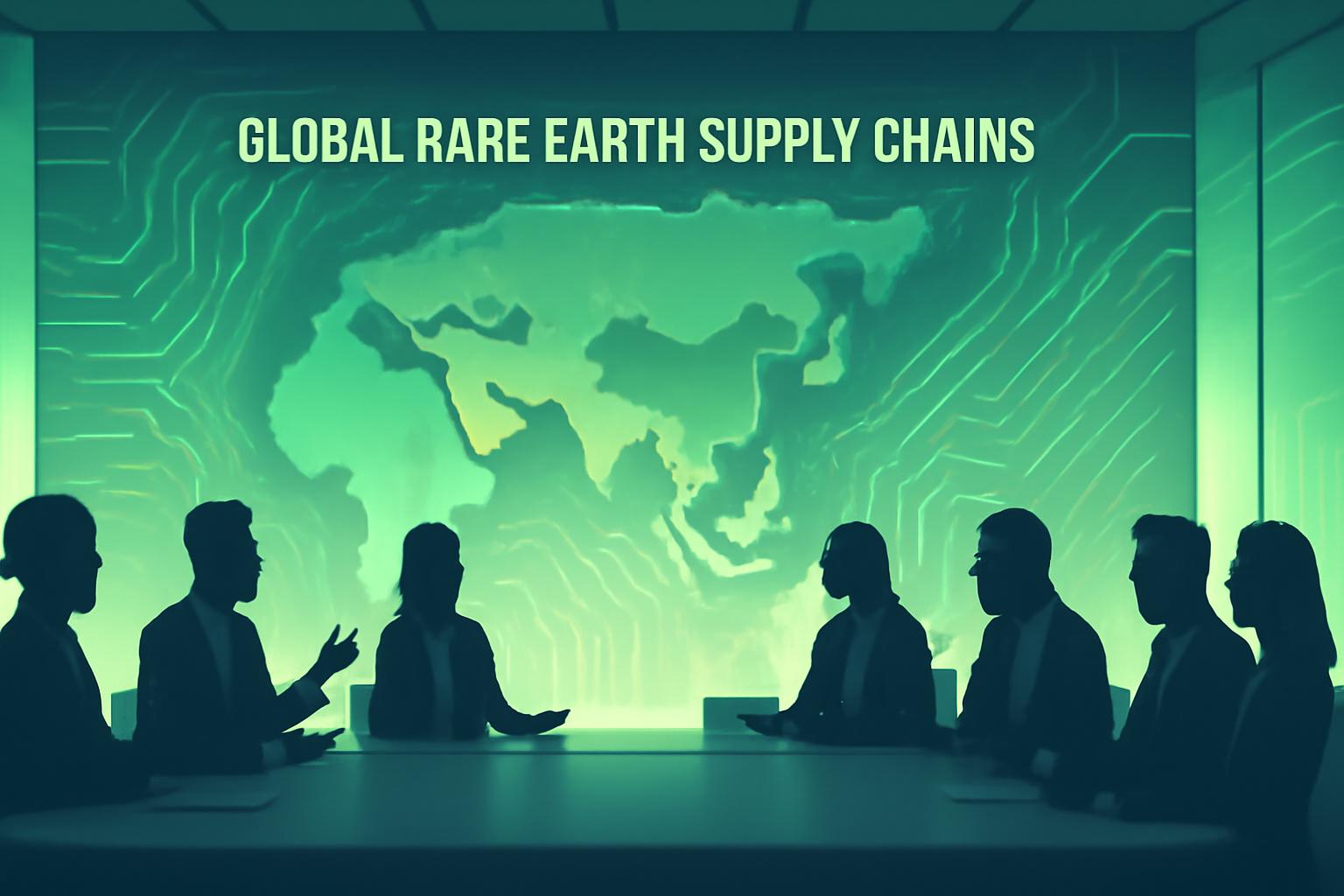FinOracleAI — Market View
President Trump’s recent rare earth supply agreements mark a significant strategic shift aimed at diluting China’s near-monopoly on critical minerals vital to advanced technologies and national security. While these deals lay the groundwork for a more diversified and resilient supply chain, the structural and environmental challenges inherent in mining and refining suggest a protracted transition period.
- Opportunities: Strengthened geopolitical alliances, increased investment in ethical mining and refining, and potential for innovation in recycling technologies.
- Risks: High capital expenditures, long development timelines, environmental compliance costs, and persistent short-term reliance on Chinese supply.
- Market impact: Positive momentum for U.S.-listed rare earth mining firms and increased investor interest in critical minerals sectors.
Impact: These agreements represent a decisive step toward reducing U.S. and allied dependency on China for rare earth materials, but meaningful supply chain diversification will require sustained investment, regulatory support, and time. Market participants should anticipate a gradual evolution rather than immediate disruption.
“Beijing’s latest threat on sweeping extraterritorial export restrictions in this sector has served as a needed wake-up call to partners around the world.”
Wendy Cutler, Asia Society Policy InstituteGeorgetown University’s Dennis Wilder noted that China’s attempts to leverage export controls beyond the U.S. may have backfired, encouraging broader international cooperation to reduce dependency on Chinese rare earth supplies.
FinOracleAI — Market View
President Trump’s recent rare earth supply agreements mark a significant strategic shift aimed at diluting China’s near-monopoly on critical minerals vital to advanced technologies and national security. While these deals lay the groundwork for a more diversified and resilient supply chain, the structural and environmental challenges inherent in mining and refining suggest a protracted transition period.
- Opportunities: Strengthened geopolitical alliances, increased investment in ethical mining and refining, and potential for innovation in recycling technologies.
- Risks: High capital expenditures, long development timelines, environmental compliance costs, and persistent short-term reliance on Chinese supply.
- Market impact: Positive momentum for U.S.-listed rare earth mining firms and increased investor interest in critical minerals sectors.
Impact: These agreements represent a decisive step toward reducing U.S. and allied dependency on China for rare earth materials, but meaningful supply chain diversification will require sustained investment, regulatory support, and time. Market participants should anticipate a gradual evolution rather than immediate disruption.
Observers suggest that the timing of these deals was intended to strengthen the U.S. position ahead of high-stakes negotiations with China, especially amid ongoing trade tensions and threats of export restrictions.
“Beijing’s latest threat on sweeping extraterritorial export restrictions in this sector has served as a needed wake-up call to partners around the world.”
Wendy Cutler, Asia Society Policy InstituteGeorgetown University’s Dennis Wilder noted that China’s attempts to leverage export controls beyond the U.S. may have backfired, encouraging broader international cooperation to reduce dependency on Chinese rare earth supplies.
FinOracleAI — Market View
President Trump’s recent rare earth supply agreements mark a significant strategic shift aimed at diluting China’s near-monopoly on critical minerals vital to advanced technologies and national security. While these deals lay the groundwork for a more diversified and resilient supply chain, the structural and environmental challenges inherent in mining and refining suggest a protracted transition period.
- Opportunities: Strengthened geopolitical alliances, increased investment in ethical mining and refining, and potential for innovation in recycling technologies.
- Risks: High capital expenditures, long development timelines, environmental compliance costs, and persistent short-term reliance on Chinese supply.
- Market impact: Positive momentum for U.S.-listed rare earth mining firms and increased investor interest in critical minerals sectors.
Impact: These agreements represent a decisive step toward reducing U.S. and allied dependency on China for rare earth materials, but meaningful supply chain diversification will require sustained investment, regulatory support, and time. Market participants should anticipate a gradual evolution rather than immediate disruption.
The announcement of these agreements has spurred a rally in U.S.-listed rare earth mining stocks. Companies such as MP Materials, Trilogy Metals, Energy Fuels, Critical Metals, and USA Rare Earth have seen significant share price increases this year.
Observers suggest that the timing of these deals was intended to strengthen the U.S. position ahead of high-stakes negotiations with China, especially amid ongoing trade tensions and threats of export restrictions.
“Beijing’s latest threat on sweeping extraterritorial export restrictions in this sector has served as a needed wake-up call to partners around the world.”
Wendy Cutler, Asia Society Policy InstituteGeorgetown University’s Dennis Wilder noted that China’s attempts to leverage export controls beyond the U.S. may have backfired, encouraging broader international cooperation to reduce dependency on Chinese rare earth supplies.
FinOracleAI — Market View
President Trump’s recent rare earth supply agreements mark a significant strategic shift aimed at diluting China’s near-monopoly on critical minerals vital to advanced technologies and national security. While these deals lay the groundwork for a more diversified and resilient supply chain, the structural and environmental challenges inherent in mining and refining suggest a protracted transition period.
- Opportunities: Strengthened geopolitical alliances, increased investment in ethical mining and refining, and potential for innovation in recycling technologies.
- Risks: High capital expenditures, long development timelines, environmental compliance costs, and persistent short-term reliance on Chinese supply.
- Market impact: Positive momentum for U.S.-listed rare earth mining firms and increased investor interest in critical minerals sectors.
Impact: These agreements represent a decisive step toward reducing U.S. and allied dependency on China for rare earth materials, but meaningful supply chain diversification will require sustained investment, regulatory support, and time. Market participants should anticipate a gradual evolution rather than immediate disruption.
The announcement of these agreements has spurred a rally in U.S.-listed rare earth mining stocks. Companies such as MP Materials, Trilogy Metals, Energy Fuels, Critical Metals, and USA Rare Earth have seen significant share price increases this year.
Observers suggest that the timing of these deals was intended to strengthen the U.S. position ahead of high-stakes negotiations with China, especially amid ongoing trade tensions and threats of export restrictions.
“Beijing’s latest threat on sweeping extraterritorial export restrictions in this sector has served as a needed wake-up call to partners around the world.”
Wendy Cutler, Asia Society Policy InstituteGeorgetown University’s Dennis Wilder noted that China’s attempts to leverage export controls beyond the U.S. may have backfired, encouraging broader international cooperation to reduce dependency on Chinese rare earth supplies.
FinOracleAI — Market View
President Trump’s recent rare earth supply agreements mark a significant strategic shift aimed at diluting China’s near-monopoly on critical minerals vital to advanced technologies and national security. While these deals lay the groundwork for a more diversified and resilient supply chain, the structural and environmental challenges inherent in mining and refining suggest a protracted transition period.
- Opportunities: Strengthened geopolitical alliances, increased investment in ethical mining and refining, and potential for innovation in recycling technologies.
- Risks: High capital expenditures, long development timelines, environmental compliance costs, and persistent short-term reliance on Chinese supply.
- Market impact: Positive momentum for U.S.-listed rare earth mining firms and increased investor interest in critical minerals sectors.
Impact: These agreements represent a decisive step toward reducing U.S. and allied dependency on China for rare earth materials, but meaningful supply chain diversification will require sustained investment, regulatory support, and time. Market participants should anticipate a gradual evolution rather than immediate disruption.
Despite the strategic gains, experts caution about the environmental and financial costs associated with new mining and refining operations outside China. Mike Rosenberg, professor of strategic management at IESE Business School, noted that China’s low environmental standards have historically enabled it to maintain cost advantages.
Patrick Schröder, senior research fellow at Chatham House, emphasized that consumers may face higher prices for electronics and green technologies as supply chains adjust to more sustainable and transparent production methods.
Market Response and Political Implications
The announcement of these agreements has spurred a rally in U.S.-listed rare earth mining stocks. Companies such as MP Materials, Trilogy Metals, Energy Fuels, Critical Metals, and USA Rare Earth have seen significant share price increases this year.
Observers suggest that the timing of these deals was intended to strengthen the U.S. position ahead of high-stakes negotiations with China, especially amid ongoing trade tensions and threats of export restrictions.
“Beijing’s latest threat on sweeping extraterritorial export restrictions in this sector has served as a needed wake-up call to partners around the world.”
Wendy Cutler, Asia Society Policy InstituteGeorgetown University’s Dennis Wilder noted that China’s attempts to leverage export controls beyond the U.S. may have backfired, encouraging broader international cooperation to reduce dependency on Chinese rare earth supplies.
FinOracleAI — Market View
President Trump’s recent rare earth supply agreements mark a significant strategic shift aimed at diluting China’s near-monopoly on critical minerals vital to advanced technologies and national security. While these deals lay the groundwork for a more diversified and resilient supply chain, the structural and environmental challenges inherent in mining and refining suggest a protracted transition period.
- Opportunities: Strengthened geopolitical alliances, increased investment in ethical mining and refining, and potential for innovation in recycling technologies.
- Risks: High capital expenditures, long development timelines, environmental compliance costs, and persistent short-term reliance on Chinese supply.
- Market impact: Positive momentum for U.S.-listed rare earth mining firms and increased investor interest in critical minerals sectors.
Impact: These agreements represent a decisive step toward reducing U.S. and allied dependency on China for rare earth materials, but meaningful supply chain diversification will require sustained investment, regulatory support, and time. Market participants should anticipate a gradual evolution rather than immediate disruption.
Despite the strategic gains, experts caution about the environmental and financial costs associated with new mining and refining operations outside China. Mike Rosenberg, professor of strategic management at IESE Business School, noted that China’s low environmental standards have historically enabled it to maintain cost advantages.
Patrick Schröder, senior research fellow at Chatham House, emphasized that consumers may face higher prices for electronics and green technologies as supply chains adjust to more sustainable and transparent production methods.
Market Response and Political Implications
The announcement of these agreements has spurred a rally in U.S.-listed rare earth mining stocks. Companies such as MP Materials, Trilogy Metals, Energy Fuels, Critical Metals, and USA Rare Earth have seen significant share price increases this year.
Observers suggest that the timing of these deals was intended to strengthen the U.S. position ahead of high-stakes negotiations with China, especially amid ongoing trade tensions and threats of export restrictions.
“Beijing’s latest threat on sweeping extraterritorial export restrictions in this sector has served as a needed wake-up call to partners around the world.”
Wendy Cutler, Asia Society Policy InstituteGeorgetown University’s Dennis Wilder noted that China’s attempts to leverage export controls beyond the U.S. may have backfired, encouraging broader international cooperation to reduce dependency on Chinese rare earth supplies.
FinOracleAI — Market View
President Trump’s recent rare earth supply agreements mark a significant strategic shift aimed at diluting China’s near-monopoly on critical minerals vital to advanced technologies and national security. While these deals lay the groundwork for a more diversified and resilient supply chain, the structural and environmental challenges inherent in mining and refining suggest a protracted transition period.
- Opportunities: Strengthened geopolitical alliances, increased investment in ethical mining and refining, and potential for innovation in recycling technologies.
- Risks: High capital expenditures, long development timelines, environmental compliance costs, and persistent short-term reliance on Chinese supply.
- Market impact: Positive momentum for U.S.-listed rare earth mining firms and increased investor interest in critical minerals sectors.
Impact: These agreements represent a decisive step toward reducing U.S. and allied dependency on China for rare earth materials, but meaningful supply chain diversification will require sustained investment, regulatory support, and time. Market participants should anticipate a gradual evolution rather than immediate disruption.
Brodie Sutherland, CEO of Patriot Critical Minerals Corp, described the deals as a “game-changer” that will reduce U.S. vulnerabilities to Chinese export controls, stabilize rare earth prices, and promote domestic innovations in refining and recycling technologies.
Securing raw materials from allied countries enables American companies to prioritize ethical mining, efficient extraction, and value-added processing, offering a competitive advantage over subsidized foreign producers.
Environmental and Economic Challenges
Despite the strategic gains, experts caution about the environmental and financial costs associated with new mining and refining operations outside China. Mike Rosenberg, professor of strategic management at IESE Business School, noted that China’s low environmental standards have historically enabled it to maintain cost advantages.
Patrick Schröder, senior research fellow at Chatham House, emphasized that consumers may face higher prices for electronics and green technologies as supply chains adjust to more sustainable and transparent production methods.
Market Response and Political Implications
The announcement of these agreements has spurred a rally in U.S.-listed rare earth mining stocks. Companies such as MP Materials, Trilogy Metals, Energy Fuels, Critical Metals, and USA Rare Earth have seen significant share price increases this year.
Observers suggest that the timing of these deals was intended to strengthen the U.S. position ahead of high-stakes negotiations with China, especially amid ongoing trade tensions and threats of export restrictions.
“Beijing’s latest threat on sweeping extraterritorial export restrictions in this sector has served as a needed wake-up call to partners around the world.”
Wendy Cutler, Asia Society Policy InstituteGeorgetown University’s Dennis Wilder noted that China’s attempts to leverage export controls beyond the U.S. may have backfired, encouraging broader international cooperation to reduce dependency on Chinese rare earth supplies.
FinOracleAI — Market View
President Trump’s recent rare earth supply agreements mark a significant strategic shift aimed at diluting China’s near-monopoly on critical minerals vital to advanced technologies and national security. While these deals lay the groundwork for a more diversified and resilient supply chain, the structural and environmental challenges inherent in mining and refining suggest a protracted transition period.
- Opportunities: Strengthened geopolitical alliances, increased investment in ethical mining and refining, and potential for innovation in recycling technologies.
- Risks: High capital expenditures, long development timelines, environmental compliance costs, and persistent short-term reliance on Chinese supply.
- Market impact: Positive momentum for U.S.-listed rare earth mining firms and increased investor interest in critical minerals sectors.
Impact: These agreements represent a decisive step toward reducing U.S. and allied dependency on China for rare earth materials, but meaningful supply chain diversification will require sustained investment, regulatory support, and time. Market participants should anticipate a gradual evolution rather than immediate disruption.
Wendy Cutler, Senior Vice President at the Asia Society Policy Institute, highlighted the potential for these agreements to evolve into a plurilateral framework with strong commitments, pooled resources, and financing support. Such collaboration could enhance the collective bargaining power of participating nations and accelerate industry development.
Brodie Sutherland, CEO of Patriot Critical Minerals Corp, described the deals as a “game-changer” that will reduce U.S. vulnerabilities to Chinese export controls, stabilize rare earth prices, and promote domestic innovations in refining and recycling technologies.
Securing raw materials from allied countries enables American companies to prioritize ethical mining, efficient extraction, and value-added processing, offering a competitive advantage over subsidized foreign producers.
Environmental and Economic Challenges
Despite the strategic gains, experts caution about the environmental and financial costs associated with new mining and refining operations outside China. Mike Rosenberg, professor of strategic management at IESE Business School, noted that China’s low environmental standards have historically enabled it to maintain cost advantages.
Patrick Schröder, senior research fellow at Chatham House, emphasized that consumers may face higher prices for electronics and green technologies as supply chains adjust to more sustainable and transparent production methods.
Market Response and Political Implications
The announcement of these agreements has spurred a rally in U.S.-listed rare earth mining stocks. Companies such as MP Materials, Trilogy Metals, Energy Fuels, Critical Metals, and USA Rare Earth have seen significant share price increases this year.
Observers suggest that the timing of these deals was intended to strengthen the U.S. position ahead of high-stakes negotiations with China, especially amid ongoing trade tensions and threats of export restrictions.
“Beijing’s latest threat on sweeping extraterritorial export restrictions in this sector has served as a needed wake-up call to partners around the world.”
Wendy Cutler, Asia Society Policy InstituteGeorgetown University’s Dennis Wilder noted that China’s attempts to leverage export controls beyond the U.S. may have backfired, encouraging broader international cooperation to reduce dependency on Chinese rare earth supplies.
FinOracleAI — Market View
President Trump’s recent rare earth supply agreements mark a significant strategic shift aimed at diluting China’s near-monopoly on critical minerals vital to advanced technologies and national security. While these deals lay the groundwork for a more diversified and resilient supply chain, the structural and environmental challenges inherent in mining and refining suggest a protracted transition period.
- Opportunities: Strengthened geopolitical alliances, increased investment in ethical mining and refining, and potential for innovation in recycling technologies.
- Risks: High capital expenditures, long development timelines, environmental compliance costs, and persistent short-term reliance on Chinese supply.
- Market impact: Positive momentum for U.S.-listed rare earth mining firms and increased investor interest in critical minerals sectors.
Impact: These agreements represent a decisive step toward reducing U.S. and allied dependency on China for rare earth materials, but meaningful supply chain diversification will require sustained investment, regulatory support, and time. Market participants should anticipate a gradual evolution rather than immediate disruption.
Wendy Cutler, Senior Vice President at the Asia Society Policy Institute, highlighted the potential for these agreements to evolve into a plurilateral framework with strong commitments, pooled resources, and financing support. Such collaboration could enhance the collective bargaining power of participating nations and accelerate industry development.
Brodie Sutherland, CEO of Patriot Critical Minerals Corp, described the deals as a “game-changer” that will reduce U.S. vulnerabilities to Chinese export controls, stabilize rare earth prices, and promote domestic innovations in refining and recycling technologies.
Securing raw materials from allied countries enables American companies to prioritize ethical mining, efficient extraction, and value-added processing, offering a competitive advantage over subsidized foreign producers.
Environmental and Economic Challenges
Despite the strategic gains, experts caution about the environmental and financial costs associated with new mining and refining operations outside China. Mike Rosenberg, professor of strategic management at IESE Business School, noted that China’s low environmental standards have historically enabled it to maintain cost advantages.
Patrick Schröder, senior research fellow at Chatham House, emphasized that consumers may face higher prices for electronics and green technologies as supply chains adjust to more sustainable and transparent production methods.
Market Response and Political Implications
The announcement of these agreements has spurred a rally in U.S.-listed rare earth mining stocks. Companies such as MP Materials, Trilogy Metals, Energy Fuels, Critical Metals, and USA Rare Earth have seen significant share price increases this year.
Observers suggest that the timing of these deals was intended to strengthen the U.S. position ahead of high-stakes negotiations with China, especially amid ongoing trade tensions and threats of export restrictions.
“Beijing’s latest threat on sweeping extraterritorial export restrictions in this sector has served as a needed wake-up call to partners around the world.”
Wendy Cutler, Asia Society Policy InstituteGeorgetown University’s Dennis Wilder noted that China’s attempts to leverage export controls beyond the U.S. may have backfired, encouraging broader international cooperation to reduce dependency on Chinese rare earth supplies.
FinOracleAI — Market View
President Trump’s recent rare earth supply agreements mark a significant strategic shift aimed at diluting China’s near-monopoly on critical minerals vital to advanced technologies and national security. While these deals lay the groundwork for a more diversified and resilient supply chain, the structural and environmental challenges inherent in mining and refining suggest a protracted transition period.
- Opportunities: Strengthened geopolitical alliances, increased investment in ethical mining and refining, and potential for innovation in recycling technologies.
- Risks: High capital expenditures, long development timelines, environmental compliance costs, and persistent short-term reliance on Chinese supply.
- Market impact: Positive momentum for U.S.-listed rare earth mining firms and increased investor interest in critical minerals sectors.
Impact: These agreements represent a decisive step toward reducing U.S. and allied dependency on China for rare earth materials, but meaningful supply chain diversification will require sustained investment, regulatory support, and time. Market participants should anticipate a gradual evolution rather than immediate disruption.
Analysts emphasize that while these new deals represent a critical step forward, the transition away from Chinese dominance will be gradual. Developing new mines can take up to a decade, and establishing refining facilities requires approximately five years according to Goldman Sachs estimates.
Strategic Importance and Long-Term Benefits
Wendy Cutler, Senior Vice President at the Asia Society Policy Institute, highlighted the potential for these agreements to evolve into a plurilateral framework with strong commitments, pooled resources, and financing support. Such collaboration could enhance the collective bargaining power of participating nations and accelerate industry development.
Brodie Sutherland, CEO of Patriot Critical Minerals Corp, described the deals as a “game-changer” that will reduce U.S. vulnerabilities to Chinese export controls, stabilize rare earth prices, and promote domestic innovations in refining and recycling technologies.
Securing raw materials from allied countries enables American companies to prioritize ethical mining, efficient extraction, and value-added processing, offering a competitive advantage over subsidized foreign producers.
Environmental and Economic Challenges
Despite the strategic gains, experts caution about the environmental and financial costs associated with new mining and refining operations outside China. Mike Rosenberg, professor of strategic management at IESE Business School, noted that China’s low environmental standards have historically enabled it to maintain cost advantages.
Patrick Schröder, senior research fellow at Chatham House, emphasized that consumers may face higher prices for electronics and green technologies as supply chains adjust to more sustainable and transparent production methods.
Market Response and Political Implications
The announcement of these agreements has spurred a rally in U.S.-listed rare earth mining stocks. Companies such as MP Materials, Trilogy Metals, Energy Fuels, Critical Metals, and USA Rare Earth have seen significant share price increases this year.
Observers suggest that the timing of these deals was intended to strengthen the U.S. position ahead of high-stakes negotiations with China, especially amid ongoing trade tensions and threats of export restrictions.
“Beijing’s latest threat on sweeping extraterritorial export restrictions in this sector has served as a needed wake-up call to partners around the world.”
Wendy Cutler, Asia Society Policy InstituteGeorgetown University’s Dennis Wilder noted that China’s attempts to leverage export controls beyond the U.S. may have backfired, encouraging broader international cooperation to reduce dependency on Chinese rare earth supplies.
FinOracleAI — Market View
President Trump’s recent rare earth supply agreements mark a significant strategic shift aimed at diluting China’s near-monopoly on critical minerals vital to advanced technologies and national security. While these deals lay the groundwork for a more diversified and resilient supply chain, the structural and environmental challenges inherent in mining and refining suggest a protracted transition period.
- Opportunities: Strengthened geopolitical alliances, increased investment in ethical mining and refining, and potential for innovation in recycling technologies.
- Risks: High capital expenditures, long development timelines, environmental compliance costs, and persistent short-term reliance on Chinese supply.
- Market impact: Positive momentum for U.S.-listed rare earth mining firms and increased investor interest in critical minerals sectors.
Impact: These agreements represent a decisive step toward reducing U.S. and allied dependency on China for rare earth materials, but meaningful supply chain diversification will require sustained investment, regulatory support, and time. Market participants should anticipate a gradual evolution rather than immediate disruption.
Trump’s Rare Earth Agreements Aim to Diminish China’s Market Control but Challenges Persist
In a strategic push to weaken China’s grip on the global rare earth minerals market, U.S. President Donald Trump recently finalized a series of critical supply deals with key Asia-Pacific partners. These agreements, signed over a span of ten days, include commitments from Australia, Malaysia, Cambodia, and Japan to secure essential minerals used in batteries, automotive manufacturing, defense systems, and semiconductors.
The timing of these accords precedes Trump’s anticipated meeting with Chinese President Xi Jinping in Busan, reflecting Washington’s broader effort to counter Beijing’s dominant position in the rare earth sector.
China’s Dominance in Rare Earths Remains Overwhelming
China currently controls approximately 69% of global rare earth mining, 92% of refining capacity, and an estimated 98% of magnet manufacturing. This concentration presents a significant challenge for the United States and its allies seeking to diversify supply chains.
“In the medium term, we will get off the Chinese supply chain, but in the short term, there’s still a great deal of dependency on China.”
Dennis Wilder, Senior Fellow at Georgetown UniversityAnalysts emphasize that while these new deals represent a critical step forward, the transition away from Chinese dominance will be gradual. Developing new mines can take up to a decade, and establishing refining facilities requires approximately five years according to Goldman Sachs estimates.
Strategic Importance and Long-Term Benefits
Wendy Cutler, Senior Vice President at the Asia Society Policy Institute, highlighted the potential for these agreements to evolve into a plurilateral framework with strong commitments, pooled resources, and financing support. Such collaboration could enhance the collective bargaining power of participating nations and accelerate industry development.
Brodie Sutherland, CEO of Patriot Critical Minerals Corp, described the deals as a “game-changer” that will reduce U.S. vulnerabilities to Chinese export controls, stabilize rare earth prices, and promote domestic innovations in refining and recycling technologies.
Securing raw materials from allied countries enables American companies to prioritize ethical mining, efficient extraction, and value-added processing, offering a competitive advantage over subsidized foreign producers.
Environmental and Economic Challenges
Despite the strategic gains, experts caution about the environmental and financial costs associated with new mining and refining operations outside China. Mike Rosenberg, professor of strategic management at IESE Business School, noted that China’s low environmental standards have historically enabled it to maintain cost advantages.
Patrick Schröder, senior research fellow at Chatham House, emphasized that consumers may face higher prices for electronics and green technologies as supply chains adjust to more sustainable and transparent production methods.
Market Response and Political Implications
The announcement of these agreements has spurred a rally in U.S.-listed rare earth mining stocks. Companies such as MP Materials, Trilogy Metals, Energy Fuels, Critical Metals, and USA Rare Earth have seen significant share price increases this year.
Observers suggest that the timing of these deals was intended to strengthen the U.S. position ahead of high-stakes negotiations with China, especially amid ongoing trade tensions and threats of export restrictions.
“Beijing’s latest threat on sweeping extraterritorial export restrictions in this sector has served as a needed wake-up call to partners around the world.”
Wendy Cutler, Asia Society Policy InstituteGeorgetown University’s Dennis Wilder noted that China’s attempts to leverage export controls beyond the U.S. may have backfired, encouraging broader international cooperation to reduce dependency on Chinese rare earth supplies.
FinOracleAI — Market View
President Trump’s recent rare earth supply agreements mark a significant strategic shift aimed at diluting China’s near-monopoly on critical minerals vital to advanced technologies and national security. While these deals lay the groundwork for a more diversified and resilient supply chain, the structural and environmental challenges inherent in mining and refining suggest a protracted transition period.
- Opportunities: Strengthened geopolitical alliances, increased investment in ethical mining and refining, and potential for innovation in recycling technologies.
- Risks: High capital expenditures, long development timelines, environmental compliance costs, and persistent short-term reliance on Chinese supply.
- Market impact: Positive momentum for U.S.-listed rare earth mining firms and increased investor interest in critical minerals sectors.
Impact: These agreements represent a decisive step toward reducing U.S. and allied dependency on China for rare earth materials, but meaningful supply chain diversification will require sustained investment, regulatory support, and time. Market participants should anticipate a gradual evolution rather than immediate disruption.













